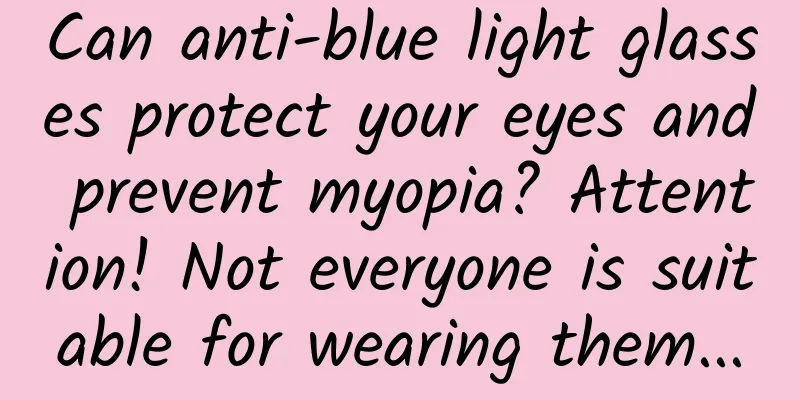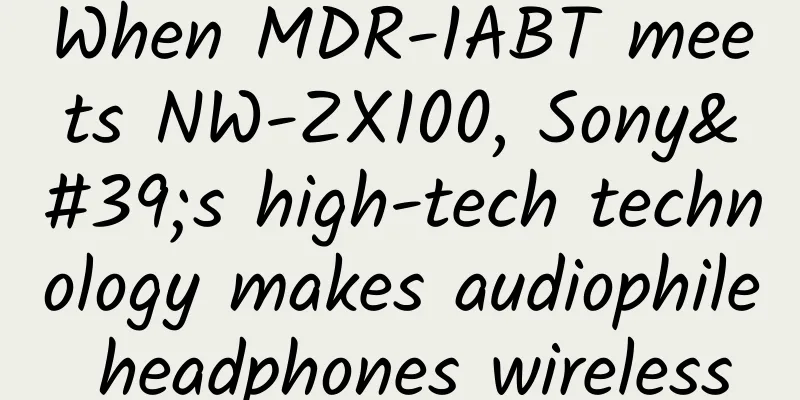Can anti-blue light glasses protect your eyes and prevent myopia? Attention! Not everyone is suitable for wearing them...

|
Expert of this article: Li Zongou, Master of Ophthalmology, First Affiliated Hospital of Dalian Medical University This article was reviewed by Xu Qibin, associate chief physician, deputy director of the Department of Ophthalmology, Zhejiang Provincial Hospital of Integrated Traditional Chinese and Western Medicine I believe you must have heard of blue light blocking glasses? Many people need to use their mobile phones and computers for long periods of time, so they wear blue light blocking glasses. Many parents have heard that such glasses can prevent myopia, so they have prepared a pair for their children. Gradually, blue light blocking glasses have become a "magic tool for eye protection." But is it really that magical? What is blue light? Why should we protect against it? Can blue light blocking glasses really prevent myopia? Let's take a closer look. What is blue light and what effects does it have on the eyes? The natural light we often talk about, that is, sunlight, is composed of seven different colors of light: red, orange, yellow, green, blue, indigo and violet. Among them, "blue" is what we call blue light, and its wavelength range is between 380nm and 500nm. The effects of blue light on the eyes have both advantages and disadvantages: Long-wave blue light with a wavelength range of 440nm-500nm is beneficial It can reach the optic nerve through the retina and be transmitted to the hypothalamus to synthesize melatonin and serotonin, which can help sleep, improve mood, and enhance memory. Short-wave blue light with a wavelength range of 380nm-440nm is harmful It can reduce sleep quality and even cause photodamage to the retina. In addition to sunlight, lights and light from electronic screens all have blue light distribution. At present, the energy of blue light from all qualified regular lamps is within the safe range, so the impact of blue light emitted by daily lamps on normal people's eyes is negligible. The proportion of short-wave blue light in screen light is higher than that in sunlight, but the total energy is far less than that of sunlight. Qualified electronic products produced by the factory are also not enough to cause damage to the retina. At present, relevant experiments have confirmed that large doses of long-term continuous blue light exposure will cause apoptosis of retinal photoreceptor cells. However, since the blue light energy distributed by screen light is relatively low and most people use electronic screens within a reasonable time, there have been no cases of direct damage to the human retina by screen blue light. What is the principle of anti-blue light glasses? To the naked eye, anti-blue light glasses appear to be covered with a layer of yellow film, which reflects short-wave blue light through a layer of coating on the surface of the lens; or an anti-blue light factor is added to the base material of the lens to absorb blue light. According to the standard of "Technical Requirements for Optical Health and Optical Safety Application of Blue Light Protection Film", the light transmittance of long-wave blue light must be greater than 80%, which means that there is no need to protect against long-wave blue light, which is beneficial blue light; what anti-blue light glasses really need to reflect and absorb is harmful blue light, which is short-wave blue light. However, the quality of blue light blocking glasses on the market is uneven. Some unqualified blue light blocking glasses, although they can block short-wave blue light, also block long-wave blue light. Therefore, when choosing blue light blocking glasses, you must pay attention to their light transmittance for long-wave blue light. Can anti-blue light glasses prevent myopia from getting worse? There is currently no direct evidence that blue light blocking glasses can prevent myopia from worsening. We often say that looking at computers, TV, and mobile phones for a long time will cause vision loss. This is because staring at close objects for a long time will cause changes in the refractive system or eye axis, thereby affecting vision. Therefore, it is not necessary for teenagers and children who hope to slow down the progression of myopia by wearing anti-blue light glasses. Although blue light has little to do with myopia, it has a significant impact on patients with dry eye syndrome. In 2016, Japanese dry eye expert Minako Kaido confirmed that for patients with dry eye syndrome, reducing the exposure of short-wave blue light to the eyes can effectively improve dry eye symptoms. Therefore, people who need to work in front of the screen for a long time will feel comfortable when wearing blue light blocking glasses. These people are recommended to wear ① Suitable for screen workers with dry eye symptoms: Because blocking short-wave blue light can improve the stability of tear film in patients with dry eye syndrome, anti-blue light glasses can reduce visual fatigue for screen workers. ② Suitable for people who already have macular degeneration: Short-wave blue light has stronger penetrating power for people who already have fundus lesions than for normal people, and wearing anti-blue light glasses may have a certain effect. ③ Suitable for people engaged in special jobs, such as workers who burn glass and use electric welding: This group of people may be exposed to large doses of blue light, so they need more professional protective glasses to protect the retina. This kind of people are not suitable to wear ① Not suitable for adolescents and children who want to prevent and control myopia: There is currently no report proving that wearing anti-blue light glasses can slow the development of myopia, and the base color of anti-blue light glasses is yellowish, which may affect children's visual development. ② Not suitable for people who have high requirements for color recognition: Blue light glasses will block blue light, exposing blue's complementary color yellow, and the color of the screen will be distorted, which may have a certain impact on the work of such people. so Different wavelengths of blue light have different effects on the eyes What we need to protect against is short-wave blue light Blue light blocking glasses cannot prevent myopia But it can improve dry eye symptoms Not everyone is suitable to wear it Do you understand? The pictures in this article with the "Science Popularization China" watermark are all from the copyright gallery. The pictures are not authorized for reprinting. |
>>: This isn't a crushed Oreo, it's a fish
Recommend
Families, please type "Protect Human Relatives" on the public screen
Produced by: Science Popularization China Produce...
In Xi'an, looking forward to Chang'an!
One day in the 8th century A group of Sogdian mer...
Baidu search oCPC four-stage optimization direction
Regarding the four-stage optimization directions ...
Why is the sky blue? And not all seven colors like a rainbow?
Looking up, it was another beautiful day with blu...
Yu Chengdong: Huawei has developed its own operating system, just in case
Huawei’s consumer business CEO Richard Yu said th...
New way to play TV games: KO Arcade Customized Edition Onmyoji Arcade Joystick Picture Appreciation
With the popularity of TV games, players have hig...
Heartbroken! Missing 5-year-old twins drowned! Be sure to read these first aid tips, they can save lives!
On May 15, the People's Government of Zhushan...
A day's plan begins in the morning. How should you eat breakfast?
As the Chinese saying goes, a day's plan begi...
Does breathing affect vision? Scientists discover mysterious rules of pupils →
Compiled by: Gong Zixin Like the aperture of a ca...
Apple plans to launch a new energy vehicle in 2024, which will use "breakthrough" self-developed battery technology
As new energy vehicle companies have dominated th...
Stock trading introductory video tutorial, stock zero basic knowledge learning e-book practical training course complete set
Stock trading introductory video tutorial, stock ...
How does Weitao make money? Share a micro headline brick moving project, simple operation, 30 minutes a day, stable income of 100 yuan
In fact, many people are keen on finding various ...
How to optimize the Meizu App Store? Meizu App Store optimization tips!
I think everyone is familiar with the Meizu brand...
Are the popular Wu Tiao Ren actually marketing experts?
There is a theory of a hit product creation model...
How to maximize the effectiveness of overseas KOL promotion and marketing?
Internet celebrity marketing is different from ot...









